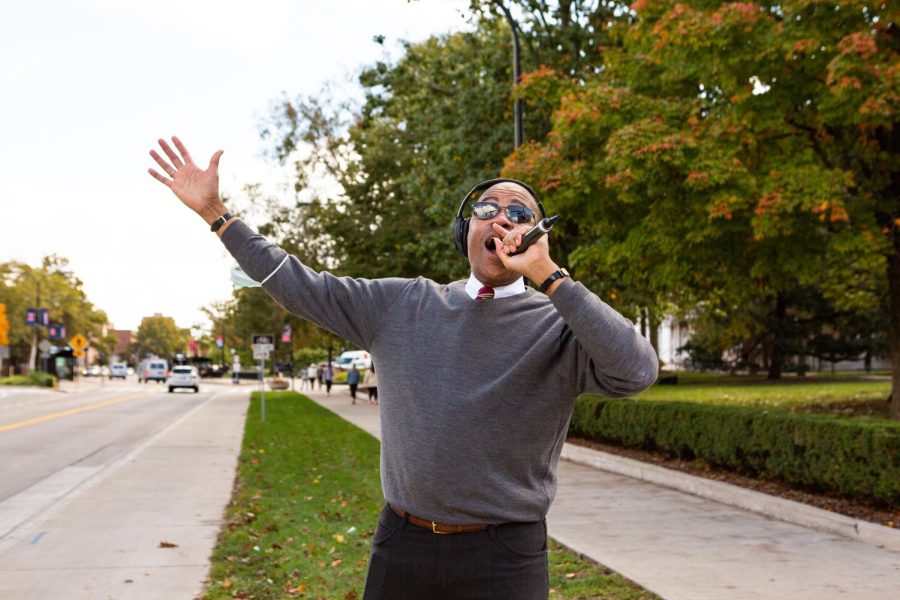Sociology professor raps on campus hot spots
Reginald A. Stuckey, sociology professor at the University, raps on Green Street as a way to express himself creatively.
Nov 10, 2021
At the street corner in front of Alma Mater, it isn’t uncommon to see a man animatedly gesturing and rapping along to music only he can hear.
He’s occasionally loud enough that passersby on the Main Quad turn their heads.
His clothes can range from business attire to sweats or a bright yellow vest, but a microphone, glasses and black headphones are constant.
He calls himself Reginald A. Stuckey. It’s the stage name of Reuben A. Buford May, a sociology professor at the University.
“It’s an extension of myself,” Stuckey said. “It is a way or an outlet for me to share creativity in a way that I really feel very strongly about.”
Get The Daily Illini in your inbox!
Professor May is known in the academic community as an award-winning author, scholar and teacher. The persona Stuckey first came about when he was a college student at Aurora University in the suburbs of Chicago.
“I was just in a gym one day, shooting around, and you know how you pretend like the clock is running out? Five, four, three, two, one — ‘he shoots and he scores, Stuckey scores,’” he said. “I’m thinking, ‘Oh, well, Stuckey is a good little nickname.’”
It became a nickname and a new identity, Stuckey said.
“This personification of the best, the best basketball player, the best student, the smartest guy,” he said.
Stuckey has been rapping since the 80s, when hip hop first became popular in his native Chicago. He always made personal videos and produced music, but he didn’t go public until one of his students at Texas A&M University asked him to rap for her in 2011.
Stuckey told her he didn’t know his own lyrics, and she told him to learn them.
“I started practicing rapping, to memorize the lyrics and build up my confidence outside,” Stuckey said. “I started standing on the benches and standing on the street corners, and I discovered that it’s one of those things I really, really enjoy.”
He compared his street corner performances to a runner’s high; even talking about it gets him excited, Stuckey said.
“It’s so cathartic … It’s just something I never would have understood that I enjoyed that way until the student was like, “Hey, you need to learn your lyrics,’” he said.
Songwriting is like writing in a diary, Stuckey said. He often translates his life experiences to his raps, usually using metaphors and codes.
In one song, Stuckey raps about two girls being interested in him, but he said it’s actually referring to two different universities making him a job offer.
“This is all part of my life; I just translated it into hip hop music, and I enjoy doing it,” he said.
Stuckey grew a following at Texas A&M University after performing for several years, to the point where he would get stopped in restaurants by students telling him, “You’re a legend.”
He performed at Texas A&M University’s football stadium and even at Chicago’s House of Blues.
But Stuckey said the reception at Illinois hasn’t been the same.
“People are a bit more low-key here,” he said.
Well-aware that many may see him as “a crazy homeless person,” Stuckey said people just need to understand it’s his passion showing through. He’s even been offered money and has to explain that he’s a professor.
“I think it’ll open up when they see that it’s really a passion and a natural enthusiasm for what I’m doing,” Stuckey said.
He’s even interacted with the local police numerous times.
“As soon as they talk to me, they realize, ‘Oh, this guy, he’s not crazy, he’s not homeless. He’s just having fun,’” Stuckey said.
As to why this is the automatic reaction, Stuckey said that people naturally make snap judgements.
“I don’t have an experiment or anything going, but what I’m always struck by is that people never really know that I’m that same person.”
Fatou Jobe, graduate student in LAS, said she first saw Stuckey a few months before the interview process for her doctoral sociology program, where he was on the interview committee. Jobe said she was really surprised when she finally made the connection that her professor was also the man she saw rapping around campus.
“I became interested in learning more about his approach to dividing the academic life and also personal life because it’s really hard to bridge that gap,” Jobe said. “I’m also a big fan of hip hop.”
Stuckey’s different identities as a Black man, a respected professor and a musician inspired Jobe to balance her own identities, she said.
“He inspires me to be unapologetically me,” Jobe said.
Stuckey said personal passion drives him to continue producing and performing music. It’s also about connecting with people, students like Jobe and other musicians or artists, with whom he said he’s always happy to work.
“This gives me another way to connect with people and share an inspiration,” Stuckey said.
Stuckey said he hopes those walking by realize he’s just doing his thing and are not afraid to say hi.
“They don’t have to stop me, just come up to me,” he said. “Fist bump me and that way I know. And then I’m really enjoying myself.”






